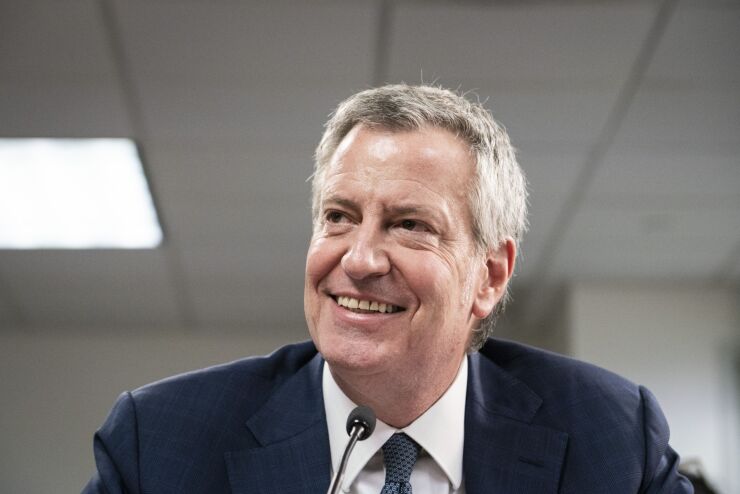A panel convened to overhaul New York City's byzantine property tax system laid out a blueprint while acknowledging the long road ahead.
The city's Advisory Commission on Property Tax Reform issued its
Property taxes provide the city's largest revenue source.

Further hearings and a final report still await. The state legislature will have final say over any action the city takes. Under municipal home-rule structure, Albany retains authority over major changes.
"There will be winners and losers," said commission chairman Marc Shaw, who is chairman of the advisory board and senior advisor at the City University of New York's Institute for State and Local Governance.
Mayor Bill de Blasio and City Council Speaker Corey Johnson formed the panel in 2018 amid a
De Blasio said the panel's work produced "the most significant reforms proposed in 40 years."
The panel said the recommendations could answer inequities and create a "simpler, clearer and fairer" system. "The current system is not transparent or simple to understand," the report said.
Presumably, taxpayers in Staten Island, the Bronx and Queens could get tax cuts while sharp increases could be in store elsewhere.
The panel calls for keeping the system in four property classes — residential, large rentals, utilities, and commercial — while moving co-ops, condominiums and rental buildings with up to 10 units into a new residential class along with one-to-three-family homes.
The group recommends using a sales-based method to value all properties in the residential class and assessing every property in the residential class at its full market value. In addition, it called for maintaining valuation methods for properties not in the new residential class — rental buildings with more than 10 units, utilities and commercial.
Also, it recommended a gradual transition to the new system for current owners, with an immediate transition into the new system for property sales in the new residential tax.
The commission asked for comprehensive reviews of the system every 10 years. The last overview came in 1993.
Property taxes will generate nearly $30 billion in fiscal 2020, or 32% of all revenues, according to Ana Champeny, director of city studies for the watchdog Citizens Budget Commission.
"The balancing act facing legislators as they consider proposals to reform the property tax is how to increase equity, fairness, and transparency, while maintaining fiscal stability and reliability," Champeny told members of the New York State Senate Standing Committee on Budget and Revenues in early December.
"Furthermore, the property tax has generally been resistant to the economic cycle," Champeny said. "This stability is due in part structural features of the tax that gradually phase-in changes in value and minimize abrupt year-to-year changes in assessed values."
Adjusted for tax policy changes such as rate changes, property tax revenue has grown in every year since fiscal year 1999, said Champeny, an average of 6.2%, unlike more economically sensitive taxes that often see year-over-year declines in revenue during or following a recession.
Other recommendations from the panel include phasing in annual market value changes in the new residential class over five years at 20% per year, with assessed value growth caps eliminated; and creating a partial homestead exemption for primary resident owners with income below a certain threshold.
In addition, the group would a circuit breaker to lower the property tax burden on low-income primary resident owners, based on the ratio of property tax paid to income.





